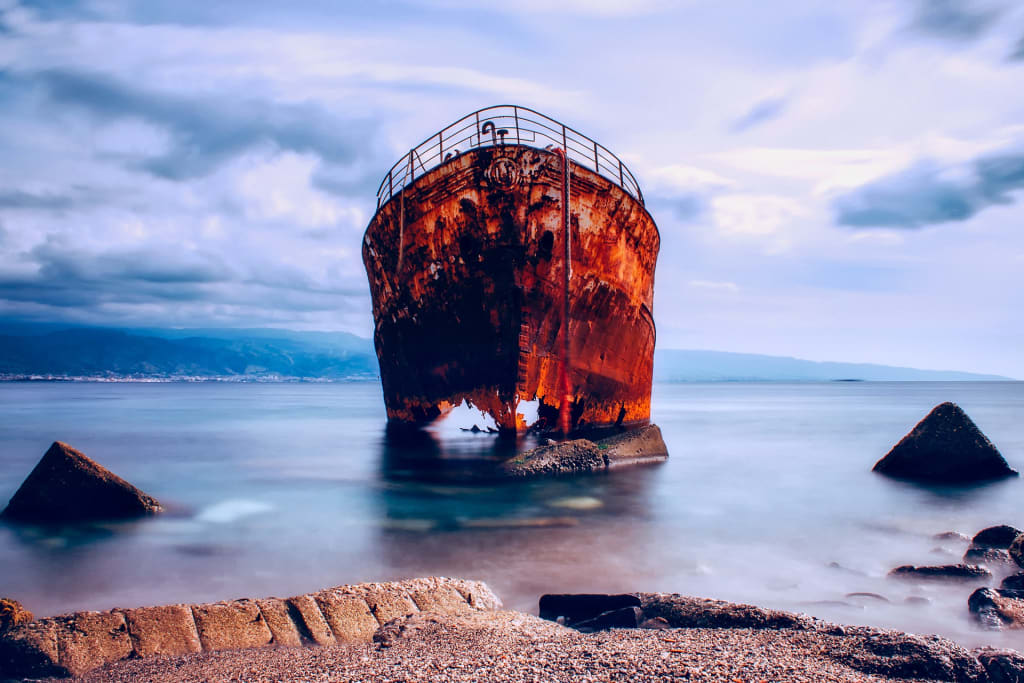Francesco Grasso, "Come un brivido nel mare"
The Messina Earthquake in a novel

“The Sevastopol lighthouse shines far to the north. The coast is rocky, scattered with small rocks at the water’s edge that resemble cut-off candles. On some of these I see tiny flames: lanterns of fishermen looking for crabs, I guess. The sky is clear. A crescent moon shines in the west. Baby waves crash softly against the hull. There is a smell of seagulls and salt. “
Despite some minor typos, probably beyond the editor’s control, the writing of “Like a shiver in the sea”, winner of the 2012 Nemo award, is very good and suggests an established talent. Sorry that it is at the service of a content where many of the premises are not met.
The story starts from an unexplored and stimulating starting point, the catastrophic Messina tsunami of December 1908, but complicates itself in fantastic and espionage developments, without being able to get over too much at once.
“Like a shiver in the sea” is a historical novel, because it mixes authentic events and characters with others of pure fantasy. The cataclysm that occurred in Messina, the character of Queen Elena — the one who, in fiction, reads the manuscript of the dying protagonist — the accident that occurred, the archbishop Arrigo Letterio, the foreign ships at anchor in the days of the earthquake belong to reality. The plot, however, immediately unfolds into fictional history, and this would not in itself be a defect, except that the supernatural and fantastic element here does not go well with real events.
In short, Queen Elena, wife of Vittorio Emanuele III, while lending compassionate help to the wounded in the Messina earthquake, collects the last confidences of a young Russian soldier of beautiful appearance, Alec Vassilievic, called Krasivin, who is handsome — where beautiful also indicates good and naive — and gives her a notebook in which he wrote the report of the last times before the cataclysm. He addresses his late brother Piotr in an epistolary form. Nothing more will be known about this brother and this is something that a novelist should never do, that is, open a path in the plot without then following it, leaving it to end up in a blind alley.
The narrative is divided into two parts, the first is set aboard the Makarov and remembers from afar certain atmospheres of Conrad or Melville, with male protagonists struggling with sea life, camaraderie and bullying. The second has a completely different register, it moves to Messina, where the local reality is observed through the distorted vision of a Russian sailor, until the epilogue that mixes the catastrophic with the paranormal.
The plot combines the most varied elements, trying to blend them together, from the Messina earthquake to the Tunguska event — or the fall of a meteorite in Siberia in the same year — to the historical events of Archbishop Arrigo Letterio, to the presence of two ships, one Russian and one British, off the city just in the days of the tsunami, to the visit of Queen Elena, to the Marian cult typical of the Messina culture, to the local underworld. But the common thread is an annoying and bulky female presence, that of Perla, a Russian spy who has the features and movements of a video game heroine. Omnipresent, she brings with her a complicated adventure of international espionage, in which Russian laboratories of study on the paranormal and leprosy seers capable of unleashing primitive telluric forces and unhinge millenary and even ethical balances converge. She also has the unbearable vice of continually telling poor Alec, as well as the reader, Greek myths that have little to do with history, if not in some underground connection due to the author’s passion for them, as well as for Russian traditions.
The doubt that the matter is tangled must also have come to Grasso, who expressed it in the metanarrative reflections of Queen Elena: “the war of spies evoked by Brasivin”, she tells us in the apostille n ° 1, “has left me a lot skeptical. “ And “I am even less convinced by the jumble of ancient, extravagant superstitions, botched Greek myths and perverse religious conjectures that Brasivin claims, to put it better he fears, to have caused the earthquake.”
The Virgin of the Letter, around which all history revolves, resembles the Mater Matuta of the Romans more than the mother of Jesus Christ. In her cult there are underground pagan currents, which have survived the centuries. This aspect is intriguing and would have deserved more development, at the expense of the adventures that take place aboard the Makarov.
“I believe, Piotr, that here in Sicily the clergy have been fighting for centuries to affirm the orthodoxy of the Scriptures on the” magical sense “with which the people live their daily relationship with the transcendent. In this sense, the myth of the Protectress, which the ecclesial hierarchies have never been able to fully absorb into the official Creed, represents a threat. “
The second part, the Sicilian one, is perhaps the best, since we understand that Grasso, from Messina, loves and knows what he describes: the rough life of the fishermen, the sweat of the brow, the team spirit, the common people struggling with a stepmother nature.
“And there, as we sing and sweat and curse together spraying each other with salt water, with our arms burning and the back creaking and the wood of the oar scratching the skin, a sensation suddenly strikes me, powerful and magnificent. A community of efforts and intentions, a solidarity between equals, a friendship and a sense of belonging that in my life I felt only in the best days on the Makarov, among the few companions I had truly come to trust. I recognize in emotion, or at least I believe, what Pasha called “true comradeship”. Feeling no longer a single person but an integral part of a Crew, a collective ritual that goes far beyond wearing the same uniform or respecting a stupid regulation. “
If there is a moral in the story, it is that “tragedy is a beacon that brings to light the best and worst that are hidden inside every man”, the heart of darkness of each of us, we could say. Thus, Serioga, Alec’s evil (and ugly) antagonist, eventually finds some redemption, while the commoner friends turn into greedy jackals. But there is also another trend, which does honor to Grasso, the one where he, through the mouth of his protagonist, denies “the will of those in charge”, the fatalism of those who bow to the abuses of bullies and the mafia mentality for which is to be considered “protection” the blackmail of criminals.
In conclusion, we can say that a tense writing like that of Grasso, such a poetic form, could express a structured content in a more conscious way, perhaps suffering some renunciation, so as not to create a dissonant rather than syncretic mixture of genres.
In short, not only in the style, but also in the weave, the rule is that it is always better to remove something, rather than add.
About the Creator
Patrizia Poli
Patrizia Poli was born in Livorno in 1961. Writer of fiction and blogger, she published seven novels.
Enjoyed the story? Support the Creator.
Subscribe for free to receive all their stories in your feed. You could also pledge your support or give them a one-off tip, letting them know you appreciate their work.






Comments
There are no comments for this story
Be the first to respond and start the conversation.